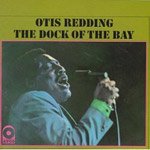“(Sittin’ On) The Dock of the Bay” was supposed to inaugurate a venture into new musical horizons for Otis Redding. Known principally for his Stax-style deep southern soul – with its raucous gospel-influenced vocals, blasts of brass, and bluesy grooves – Redding’s new record disparately mixed the bucolic sounds of country and folk with his already sundry soul repertoire to create a truly distinct, pioneering sound. Equal parts Bob Dylan, Ray Charles, and The Animals, it was an oddly effective melding of dissonant musical touchstones. Redding’s melancholic tenor and wistful, indolent lyrics (“Cause I’ve had nothing to live for/ And look like nothin’s gonna’ come my way/ So I’m just gonna’ sit on the dock of the bay/ Watching the tide roll away/ Ooo, I'm sittin’ on the dock of the bay/Wastin’ time,”) resonated even more pronouncedly in the aftermath of what occurred just three short days after the recording of this record.
Redding's new horizons were never fully reached, as providence had other plans. He and four members of The Bar-Keys, his backup band, were killed when the plane they were traveling on crashed into Lake Monona on December 10, 1967. The posthumously released album that followed, The Dock of the Bay, proved an effective elegy, as its mixture of singles, B-sides, and unreleased tracks dating back to 1965 showcase what made Redding such a beloved, and iconic figure: his ability to play Casanova.
Redding was virtually peerless when heart-wrenchingly pouring his heart out. The skilfully composed ballad “I Love You More Than Words Can Say,” with its hushed, persistent string section, slowly builds, as Redding pleads with his would-be lover: “Living without you is so painful/ I was tempted to call it a day/ You’ve got me in your hand, why can’t you understand.” Redding’s remake of the Five Keys’ seminal doo-wop classic “The Glory of Love” is a brilliant transformation, as he turns it into grand, rousing gospel. Beginning as a dirge of lost love (“let your little heart just cry a little”), Redding soon begins shouting about “the glory of love” – backed by coronation-esque trumpet bursts – like a prophet spreading the gospel of affection and devotion.
Redding’s playful side is on display as well. On “Let Me Come Home,” he plays the part of a homesick lover expounding the positive aspects of breaking up (“the makeup sex”), backed by a stellar blues groove. Meanwhile, the second most recognizable track on the album, the Top 40 hit “Tramp,” finds Redding involved in a flirty repartee with his favorite duet partner, songstress Carla Thomas: “I tell you one thing/ Well tell me/ I'm the only son-of-a-gun this side of the Sun/ You're a tramp, Otis/ No I'm not/ I don't care what you say, you're still a tramp/ What's wrong with that?”
The blues number “Ole Man Trouble” proves to be an apropos conclusion to an album that was supposed to dream so highly, but tragically never had the opportunity to do so. Pleading with “ole man trouble” to “find... someone else to pick on,” Redding proved himself to be prophetic in getting “a little worried.” Although it will never be known what heights Redding would have achieved after “(Sittin’ On) The Dock of the Bay,” The Dock of the Bay proves the canon of soul classics he left stand up perfectly well on their own to any standard of taste.
